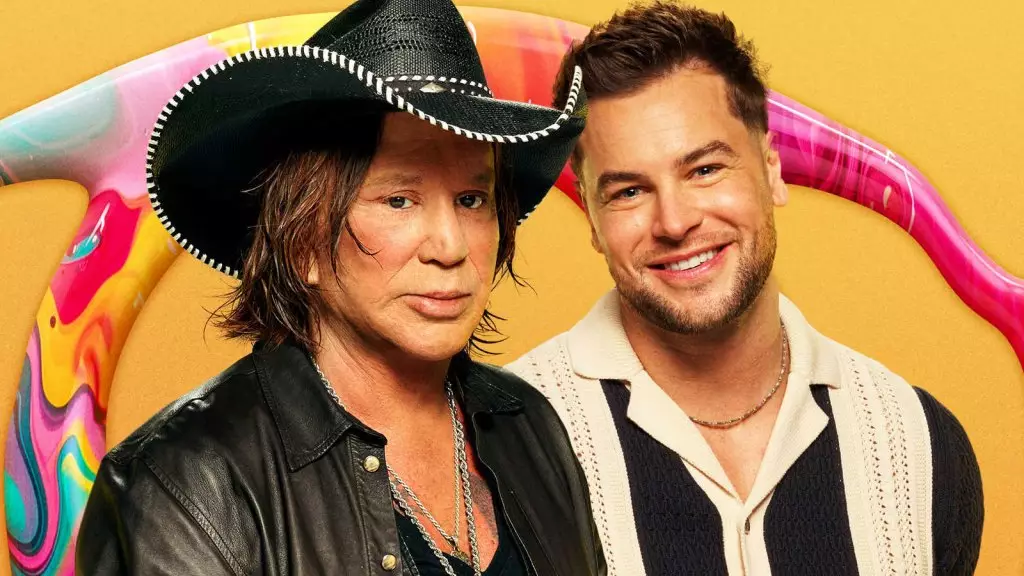Mickey Rourke’s career has been a rollercoaster ride, punctuated by spectacular highs and excruciating lows. Once heralded as Hollywood’s leading man, Rourke has gradually become synonymous with turbulence, both in personal life and professional endeavors. Recently, his tenure on Celebrity Big Brother UK came crashing down due to a series of alarming incidents. What was meant to be a new chapter for the actor turned into another episode of controversy, showcasing not just his inability to navigate public discourse but also an alarming pattern of behavior that is as troubling as it is fascinating.
Celebrity Big Brother UK, a show that thrives on drama and confrontation, was ill-equipped for Mickey Rourke’s volatile personality. In one memorable incident over a pirate-themed task, Rourke clashed brutally with fellow contestant Chris Hughes. The exchange escalated quickly, revealing deep-seated anger and a startling lack of self-control. Rourke’s comments, “Don’t eyeball me. You c***,” embodied not just a trigger-happy tongue but also a lifetime of suppressed rage that he has yet to fully confront.
The Dark Side of Reality Television
The essence of reality television is to spotlight unfiltered human behavior, often revealing the dark corners of personalities we thought we understood. Rourke’s explosive reaction is a case study in how the game’s pressures can unearth not just drama but also deep-rooted issues. As the incident unfolded, Big Brother had to step in, issuing a stark warning about Rourke’s use of aggressive language and inappropriate remarks that have no place in civilized discourse. The situation may have been entertaining for viewers, but it raised serious concerns about the psychological effects of fame and televised scrutiny on individuals, especially those with difficult pasts.
What becomes evident is that Rourke’s appearance was not merely an attempt at redemption or reinvention; it was fraught with the undertones of a man still grappling with his demons. The resultant reaction from both Rourke and his fellow housemates indicated a disconcerting familiarity with conflict, suggesting that the actor’s history of aggressive outbursts had not been fully reconciled—not with himself, nor with the world around him.
Confronting the Consequences
After a stern rebuke from Big Brother regarding his threatening language and behavior, Rourke’s reaction oscillated between remorse and defensiveness. In a heartfelt apology, he stated, “I take responsibility for doing the wrong thing. ‘Cause I lost my temper.” Herein lies the tragedy: while Rourke expressed a desire for growth, he simultaneously acknowledged a cyclical pattern of behaviors that he cannot seem to break. Such moments are telling; they reflect not merely regret but a poignant sadness—a recognition that his history is one filled with conflict and pain.
The reality check prompted by Big Brother’s ultimate decision to evict Rourke from the house might have been a wake-up call he desperately needed. Reflecting on his short fuse, he uttered, “I blame myself, I know it was my bad.” This self-awareness, however, stands in stark contrast to the immediate effects of his actions, which consistently create a rift rather than build bridges. The juxtaposition between wanting to change and being unable to do so creates an internal conflict that is both tragic and haunting.
The Ripple Effect of His Actions
Rourke’s actions did not exclusively impact himself; they also reverberated through the house, affecting his fellow contestants and the viewers at home. After previously using a homophobic slur toward JoJo Siwa, the ramifications of his destructive behavior expanded beyond a singular incident, painting a picture of a man who embodies a problematic heritage. When Siwa nominated Rourke for eviction, it underscored a wider narrative of zero tolerance for toxic behavior, a vital step when addressing the social climate of acceptance and inclusion.
Witnessing Rourke’s downfall is a reminder of the delicate nature of fame and the burdens that accompany it. As celebrities become accessible to the masses through platforms like reality television, they are often unprepared for the onslaught that follows. Yet, this does not absolve Rourke of responsibility. Each outburst serves as a grim reminder that until he confronts his inner turmoil, the cycle of self-destruction will only continue, leaving a wake of disappointment and disconnection in its path.
Legacy of Regret and Redemption?
Ultimately, Rourke’s story is emblematic of a larger dialogue about the human condition—the quest for redemption against the backdrop of persistent flaws. As Celebrity Big Brother UK continues to air episodes that capture Rourke’s volatile interactions, viewers are treated to a perverse blend of entertainment and concern. With every heated exchange, the audience is not just a spectator but also part of a cautionary tale that interrogates the complex dynamics of fame, mental health, and personal accountability.
The fate of Mickey Rourke in the Celebrity Big Brother house serves as a reminder that even stars, once glowing brightly, can find themselves eclipsed by their own shadow. While the world watches in awe and shock, a deeper question lingers: can he, will he, escape the cycle of self-destruction and emerge triumphant? Only time will tell, but the signs point toward a need for profound introspection and change.

